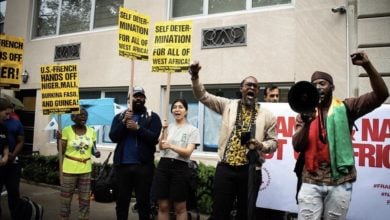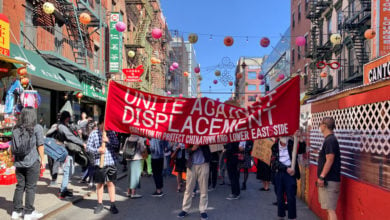The author represented the ANSWER Coalition on a weeklong speaking tour against U.S.-Japanese imperialism hosted by the Asia-Wide Campaign (AWC-Japan) from June 16-21, 2017. The speaking tour included a rally and a march in Kyoto, and public forums in Kyoto, Fukuyama, Nagoya, and Kobe.
The government of Japanese Prime Minister Shinzo Abe has a highly unpopular imperialist agenda that has been coupled with an ideological turn to nationalist chauvinism in a feeble attempt to popularize its bigoted, militarizing, capitalist pursuits. For many activists in Japan, the election of Trump reflects the same ruling-class trend of reactionary scapegoating to maintain the stability of the system as living standards decline.
Demonizing North Korea
Mobilizing support for Abe’s desire to transform Japan’s military into a completely deregulated ready-for-war army has been a major focus of his administration. The Japanese capitalist class’s move to revise its pacifist Constitution is justified in part by the supposed threat posed by the Democratic People’s Republic of Korea (DPRK or North Korea). However, North Korea has done nothing but pursued a military deterrent against external threats since the United States and Japan have rejected its requests for a peace treaty to finally end the Korean War.
Since the DPRK does not really pose an offensive threat to Japan, South Korea or the United States, a more plausible explanation for Japan’s re-militarization is its desire to secure economic interests against such rivals as China in the Asia Pacific region and elsewhere. Working to secure popular support for Japan’s shift toward militarization, Abe has glorified Japan’s pre-WWII imperialist government.
Abe has therefore moved to suppress statements in Japanese history books that reflect the extremely high human costs of imperialism. This way Japanese youth, just like in the United States, are socialized with a form of romanticized blind patriotism.
Forgetting about “comfort women”
A serious issue that really shows the barbarity of imperialism is the enslavement of girls and women during WWII who were forced into prostitution. Abe has moved to erase this grave injustice from the history books. Hundreds of thousands of women in 11 countries, including Korea and the Philippines, were forced into a form of state-sponsored slavery by the Japanese military. This horrible consequence of colonialist domination constitutes a war crime.
Revealing how important the Abe government believes it is to hide the horrors of imperialism, in 2014 Japan’s Foreign Ministry told the Japanese Consulate in New York to ask a major textbook publisher, McGraw-Hill, to alter passages on “comfort women” in one of their textbooks. Even though Japan’s Foreign Ministry was not successful, it demonstrates their dedication to portraying its imperial past in a positive light.
Outrageously, the official position of the Abe government is that there is no concrete evidence that women were forced against their will by the Imperial Japanese Army into brothels.
The struggle for justice for “comfort women”
As the movement for justice for enslaved “comfort women” has demanded that Japan offer, at the very least, a formal apology, Abe has repeatedly refused to offer one that takes responsibility of the role of the Japanese state. While Abe offered an apology in the 2015 agreement between Japan and South Korea that acknowledges that an injustice occurred, it does not place blame on the Imperial Japanese Army.
At a news conference in 2016 in Tokyo, former comfort women from East Timor, the Philippines, Indonesia and the Korean Peninsula spoke of the horrors they faced at the hands of the Imperial Japanese soldiers. They argued that the 2015 agreement between Japan and South Korea was not sufficient for many reasons, including the fact that it does not represent women from all 11 countries where Japan enslaved women and young girls during World War II.
Activists throughout the Asia Pacific and the United States, including remaining survivors, continue to agitate for justice for women forced into enslavement as so-called comfort women. Their demands include having the Japanese government offer a public apology and financial compensation to all victims in all countries, and making sure history textbooks in Japan include the true history of this injustice.





